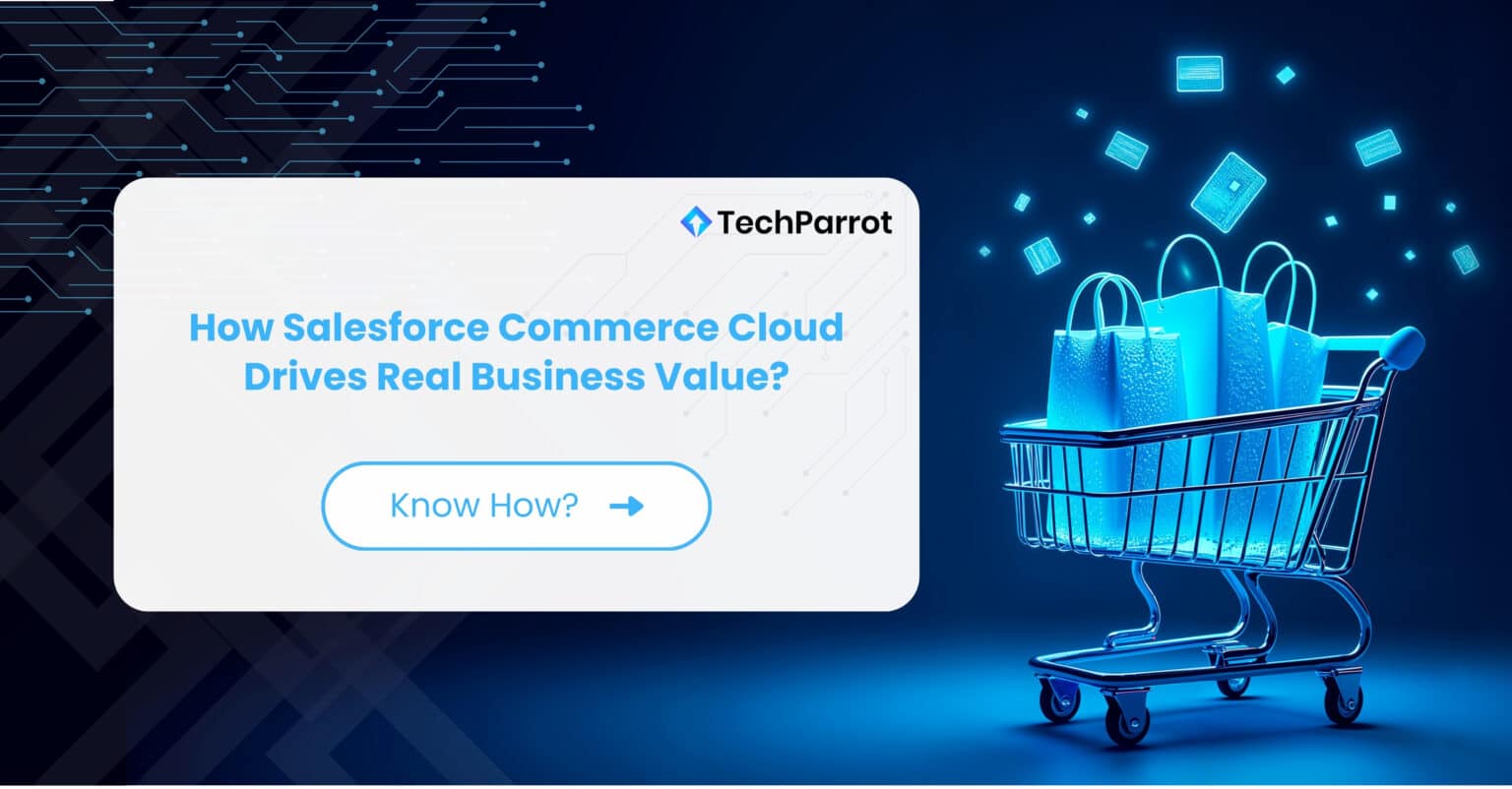Salesforce Commerce Cloud (SFCC), is well-known for its powerful capabilities, and there’s plenty of information out there highlighting its features. But let’s cut through the noise and focus on what really matters – how SFCC helps provide an exemplary customer experience and helps businesses make money.
In this two-part blog series, we’ll explore the real-world business applications and benefits of SFCC. Then we’ll zoom in into the retail and e-commerce sectors, examining how SFCC can be a game changer for these two key industries. Later, in part two, we’ll dive into the technical functionalities and also share how TechParrot helped an enterprise music retailer accelerate their digital transformation journey.
Let’s get started!
Understanding Salesforce Commerce Cloud (SFCC)
Salesforce Commerce Cloud (SFCC) is a highly scalable and comprehensive cloud-based e-commerce platform designed to meet the needs of both B2B and B2C. Whether you’re an e-commerce-only business or a brick-and-mortar retail store looking to build an online presence, SFCC delivers a unified customer experience across all touchpoints.
What makes SFCC suitable for both B2B and B2C markets is its flexibility. The uniqueness of SFCC is not just about selling products online, but also its ability to create a seamless customer journey.
For B2B, SFCC provides features such as bulk ordering, contract pricing, and personalized catalogues, which are essential in industries where businesses frequently purchase large volumes or have customized deals.
For consumer-focused businesses, SFCC offers tools that drive personalized shopping experiences through targeted marketing, AI-driven recommendations, and omnichannel capabilities. This means a customer can purchase an item online, pick it up in-store, and even return it via a different channel without any disruption to the overall shopping experience. Retailers can manage multiple storefronts from a single interface, ensuring consistent branding and customer engagement across all platforms.
BTW it’s important to note that the features and architecture of B2B and B2C Commerce are quite different. Each caters to unique use cases and business needs.
Top Functionalities of Salesforce Commerce Cloud You Will Find Valuable
Omnichannel Shopping
The omnichannel shopping experience remains one of the key strengths of the Commerce Cloud. SFCC helps your customers with a consistent and seamless experience across various touchpoints – online stores, mobile apps, social platforms, and in-store kiosks.
For instance, your customers can browse products on their phones and seamlessly transition to completing the purchase on their desktops without losing their shopping cart. This seamless experience builds customer loyalty and encourages repeat purchases.
Personalization with Einstein AI
SFCC uses its Einstein AI to deliver personalized shopping experiences. Einstein AI is a Superstar – It uses advanced machine learning and natural language processing to make sense of all your data.
Think of Einstein AI as a personal shopping assistant that understands what your customers might want even before they realize it themselves. This functionality analyzes your customer behaviour and provides tailored product recommendations, thus improving customer engagement and boosting conversion rates.
Mobile-First Design
As of 2024, approximately 80% of retail website visits globally are made via mobile devices, and these devices account for about 66% of online orders according to a report in Statista. That is huge!
SFCC is designed with a mobile-first approach to cater to this. The platform enables retailers to offer mobile-optimized web stores, ensuring faster load times, smooth navigation, and user-friendly interfaces, all of these ultimately leading to better mobile sales. Also, mobile apps can be easily integrated with existing stores to enhance the overall experience.
Multi-Site Management
SFCC supports the management of multiple storefronts from a single dashboard. This feature will be particularly beneficial for retailers with a presence in multiple geographies to tailor their offerings for different individual regions while still maintaining brand consistency.
Integrated Marketing Tools
Yes, you read it right. SFCC is not just a commerce platform, it has integrated features like merchandising automation, data based insights, A/B testing, content sharing, social media management etc that allow businesses to run targeted campaigns across various channels.
Another helpful aspect is that SFCC seamlessly integrates with other Salesforce products, such as Marketing Cloud, Service Cloud, and Salesforce CRM. This integration allows you to access customer data in real time and build more personalized marketing and service experiences.
Let’s look at a practical use case – if a customer has previously engaged with a company’s email campaign via Marketing Cloud, their data can be instantly accessed in Commerce Cloud to adjust product recommendations or offer special discounts.
Analytics and Reporting
SFCC provides comprehensive analytics tools that help businesses track performance metrics across all channels. This helps retailers to make informed decisions about inventory management, marketing strategies, and customer engagement initiatives.
For example, a clothing retailer using SFCC’s analytics can track real-time inventory across online and physical stores, allowing them to optimize stock levels, prevent overstocking, and launch targeted promotions for slow-moving items.
SFCC as a Digital Transformation Force Multiplier – Retail and E-Commerce
Digital transformation is crucial for businesses to stay competitive today (we would even go to the extent of saying, it is crucial for business survival itself). However, shifting from legacy systems to the cloud can be tough. Let’s dive into two industries where SFCC can truly accelerate this transformation—retail and e-commerce. Both have seen a massive move toward digital, especially post-pandemic. We’ll break down SFCC’s tech features in our next blog, but first, let’s explore the key business benefits.
For Retailers: Bridging Physical and Digital Worlds
We know that traditional retailers have always relied on their brick-and-mortar stores for customer interaction. Even in 2024, this holds true.
However, with the growing trend of online shopping, these retailers must offer a hybrid experience that merges in-store and digital touchpoints. SFCC enables this by providing features like “buy online, pick up in-store” (BOPIS), real-time inventory checks, and seamless returns across channels. This omnichannel approach helps retailers provide their customers with flexible shopping options. This will also help them stay competitive.
For example, let’s say a customer walks into a store, sees an item they like, but the store doesn’t have the size they are looking for. With SFCC, the store associate can immediately check the inventory across all locations, order the correct size online, and have it shipped to the customer’s home. The customer enjoys a positive experience and the retailer also hasn’t lost the sale.
Remember we spoke about Einstein AI earlier. Retailers can tap into SFCC’s AI-powered personalization to engage in-store customers.
Imagine a customer walking into a store and receiving a push notification on their phone for a discount on items they’ve previously shown interest in online. This kind of multi-channel personalization enhances customer satisfaction and drives sales.
For E-Commerce: Creating a Personalized Online Experiences
E-commerce businesses need more than just a website to succeed—they need an intelligent platform that understands their customers and adapts to their needs. SFCC provides e-commerce businesses with the tools to create highly customized and personalized shopping experiences.
With AI-driven product recommendations (Einstein AI again 😉 We will write a post on Einstein AI soon), personalized marketing messages, and seamless customer journeys, SFCC makes sure that e-commerce businesses can drive higher engagement and conversion rates.
For instance, a returning customer might see product suggestions based on their previous purchases or abandoned carts, encouraging them to complete their purchase.
Additionally, SFCC’s mobile-first design approach ensures that businesses don’t miss out on the growing number of mobile shoppers. With mobile optimization built into every storefront, customers can easily browse, search, and buy products on the go. SFCC’s global capabilities make it easy to manage multiple stores, currencies, and languages from one central platform, irrespective of time zones or geographical locations.
Closing Thoughts
In a rapidly digitalizing world, businesses need platforms that can evolve with them, and Salesforce Commerce Cloud does just that. Whether you’re a B2B firm, an e-commerce startup, or a traditional retailer, SFCC equips you with the tools necessary to create seamless, personalized, and data-driven customer experiences across all channels.
As mentioned above, in part two, we’ll dive into the technical functionalities of SFCC. We will also share how TechParrot helped an enterprise music retailer accelerate their digital transformation journey. Stay tuned.








